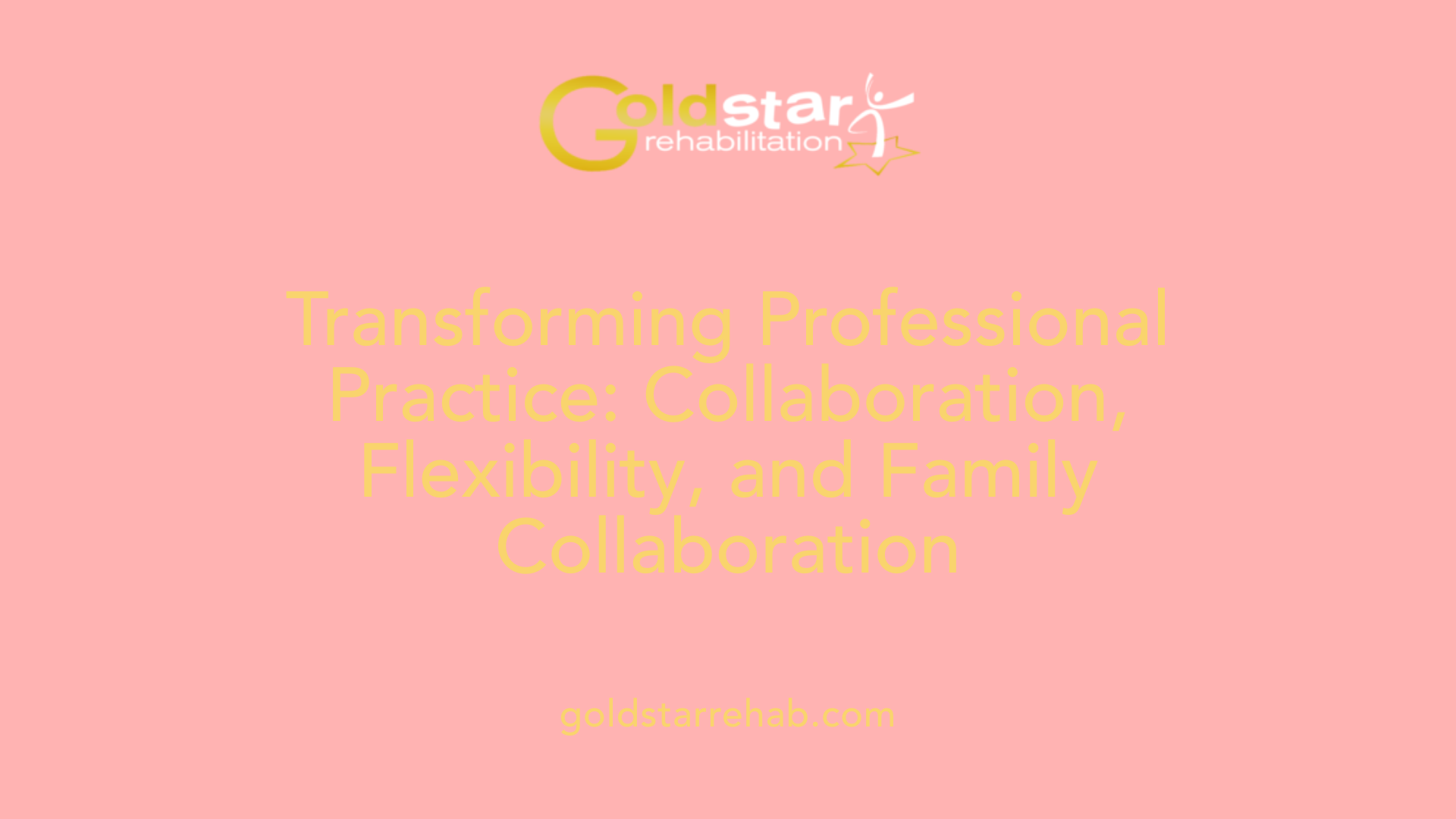The Role of Family-Centered Early Intervention Programs
Empowering Families Through Early Intervention
Understanding Family-Centered Early Intervention
Family-centered early intervention (FCEI) represents a transformative approach that places families as the central figures in supporting their children's development. Over decades, this paradigm has shifted from professional-driven models towards inclusive, partnership-based practices that recognize families as the primary decision-makers and caregivers. This article explores the historical evolution, foundational principles, operational strategies, and significant outcomes of FCEI, emphasizing its critical role in promoting optimal development for infants and toddlers with developmental delays or disabilities.
Defining Family-Centered Practice in Early Intervention

What is the definition of family-centered practice in early intervention?
Family-centered practice in early intervention is an approach that emphasizes respecting and valuing families as the primary decision-makers and caregivers for their children. It involves engaging families with dignity and cultural sensitivity, providing them with information and resources to make informed choices. This approach actively includes families in goal setting, intervention planning, and decision-making processes, promoting their strengths and capabilities.
Key components of family-centered practice include building trusting relationships, being responsive and flexible to family needs and requests, and supporting the overall well-being and competence of families. The main goal is to empower families, enabling them to support their child's development effectively and confidently.
This practice shifts the focus from professional-led services to a collaborative partnership, ensuring that family priorities and values are central to early intervention services. Ultimately, family-centered practices foster better engagement, increase the relevance of interventions, and lead to improved outcomes for children.
Historical Development and Philosophical Shifts

How has family-centered early intervention evolved over time?
Family-centered early intervention has undergone a significant transformation, shifting from models where professionals held most decision-making authority to approaches that prioritize family involvement and strength-based practices. Historically, early intervention services were often provider-led, with little input from families regarding goals and strategies. However, the landscape changed markedly in the 1970s and beyond.
Legislative milestones such as the Education for All Handicapped Children Act (P.L. 94–142) in 1975 laid the groundwork by recognizing the importance of family participation and humanizing services for children with disabilities. Later, the Education of the Handicapped Act Amendments (P.L. 99–457) in 1986 further emphasized family involvement, especially for infants and toddlers, and mandated services in natural environments.
The most notable breakthrough was the Individuals with Disabilities Education Act (IDEA) of 2004, which reinforced the importance of family-centered practices, including individualized planning, team-based approaches, and services embedded in daily routines.
Philosophically, the field experienced what is often called a ‘Copernican Revolution’ — an analogy that signifies a fundamental shift in worldview. Instead of a professional-centric model, the family is now viewed as the central unit in early intervention, with services designed to support and empower families as active collaborators.
This shift is reflected in the development of evidence-based practices such as coaching, teaming, and participatory planning, which focus on building families’ capacities and honoring cultural diversity. The alignment of research, policy, and professional standards, such as the DEC Recommended Practices (2014), underscores the importance of family engagement, routines-based supports, and collaborative decision-making.
Overall, this progression illustrates a movement toward inclusive, respectful, and culturally responsive services that recognize families’ vital role in their children's development. It also exemplifies ongoing efforts to create equitable systems that foster family empowerment and positive child outcomes.
Core Principles and Practices

What are the core principles guiding family-centered early intervention?
Family-centered early intervention (FCEI) rests on several fundamental principles designed to create meaningful and effective support for children with developmental needs and their families. One of the most vital aspects is building respectful, collaborative partnerships with families. Practitioners prioritize understanding the family’s strengths, priorities, and cultural values, ensuring that services are tailored and relevant to their unique circumstances.
A central tenet is recognizing families as active decision-makers. This approach empowers families to play an integral role in planning and implementing interventions that fit within their daily routines. Services are typically delivered in natural environments, such as the home, childcare centers, or community settings, to facilitate functional participation in everyday life.
holistic child development and family support are at the heart of FCEI. This means addressing not only the child's developmental domains—cognitive, social, emotional, physical—but also supporting the family's overall well-being and capacity to meet their child's needs.
To achieve these aims, collaboration among qualified professionals, families, and community resources is essential. This teamwork promotes consistency, responsiveness, and shared goals, ensuring that interventions are cohesive and effective.
The practices within family-centered early intervention are evidence-based and adaptable, emphasizing flexibility to meet the diverse needs of families. The ultimate goal is to foster joyful, meaningful communication, enhance developmental outcomes, and strengthen family functioning. Such an approach not only supports the child's growth but also nurtures confidence and resilience within families, creating a foundation for lifelong learning and well-being.
Operational Strategies for Effective Implementation

Embedding Embedded Coaching practices
One of the core operational strategies for family-centered early intervention is the integration of Embedded Coaching. This approach involves early intervention providers working closely with families during their daily routines and activities. By modeling and coaching within the natural context of home, community, or childcare environments, providers help families learn practical strategies to support their child's development.
Embedded Coaching emphasizes a collaborative partnership, respecting family styles, cultures, and preferences. It encourages ongoing, real-time feedback and exchange of information, empowering families to become active participants in their child's growth. This method not only enhances the child's progress but also boosts family confidence and competence.
Natural environment and routine-based interventions
Another vital strategy is conducting interventions in natural settings—homes, childcare centers, and familiar community venues. Using routines—such as mealtime, play, or dressing—as opportunities for learning makes intervention meaningful and functional.
Interventionists observe the child's interactions during these routines and tailor strategies based on child interests, strengths, and family goals. This approach aligns with theories like the zone of proximal development, encouraging active participation and skill development through everyday activities.
In Ecuador, for example, a routine-based model (RBM) demonstrated significant developmental gains over six months, with children achieving over a year's progress. Families reported feeling more competent and satisfied as they integrated strategies into daily routines.
Ongoing team communication and culturally responsive approaches
Effective early intervention relies heavily on continuous communication and collaboration among team members and families. Regular updates, shared goal setting, and collaborative decision-making ensure that strategies remain relevant and adaptable.
Culturally responsive practices are fundamental. Providers respect and incorporate family diversity, values, and cultural practices into intervention planning. This respectful approach strengthens trust, enhances engagement, and improves outcomes.
Building strong relationships and trust between families and professionals creates a supportive environment where families feel valued and empowered. Utilizing tools like eco-mapping, family stories, and self-assessment encourages active participation and amplifies the family's voice in service planning.
Overall, these operational strategies foster a cohesive, respectful, and effective system that centers family strengths, routines, and cultural contexts for optimal early intervention results.
Impact on Child Development and Family Well-Being

What are the outcomes and impacts of family-centered early intervention on child development and family quality of life?
Family-centered early intervention (FCEI) emphasizes the active involvement of families in supporting their child's growth and development. When families participate in this collaborative approach, children tend to show significant progress across multiple developmental areas. They often demonstrate improvements in communication, social-emotional skills, motor abilities, and cognitive development.
Moreover, families report feeling more confident and competent in their ability to support their child's needs. This increased confidence stems from learning new strategies tailored to their routines and cultural context. Families also experience enhanced functioning, including stronger relationships, better overall well-being, and greater resilience in facing daily challenges.
Research consolidates these observations, showing that FCEI can lead to higher satisfaction with services and improved family quality of life. Families feel more empowered, capable of making informed decisions, and actively advocating for their children. The child's developmental gains and the family's improved confidence create a positive feedback loop, fostering a supportive environment that is conducive to long-term success.
By integrating evidence-based practices into natural routines, FCEI not only addresses developmental goals but also nurtures a family's capacity to continue supporting their child beyond formal intervention settings. These outcomes underscoring the importance of family involvement highlight the profound benefits of family-centered approaches for both children and their families.
For more insights into how family-centered early intervention impacts outcomes, you can search for "outcomes of family-centered early intervention."
Challenges and Barriers

What are the challenges faced in delivering family-centered early intervention services?
Implementing family-centered early intervention services involves overcoming a variety of challenges that can impact the effectiveness and quality of support provided to families and children. One significant hurdle relates to family dynamics and engagement issues. Families come from diverse cultural, social, and economic backgrounds, which can influence their participation and perceptions of intervention. Managing complex family relationships, conflicts, and varying levels of motivation requires skilled, culturally responsive practitioners who can build trust and foster positive collaboration.
Therapist preparedness and training present another critical challenge. Early intervention providers need specialized knowledge and competencies to effectively deliver family-centered practices. This includes skills in constructing genograms, facilitating family-led goal setting, and employing evidence-based strategies within natural routines. However, some professionals may feel insecure or lack confidence in applying these approaches, especially when transitioning from traditional, therapist-led models. Insufficient training and ongoing professional development can limit their ability to implement family-centered care appropriately.
Environmental and systemic obstacles further complicate service delivery. Coordinating services across multiple providers, navigating legislation, and securing resources require organizational support and clear communication pathways. These systemic issues can delay or disrupt intervention, making it harder to sustain consistent, meaningful family engagement. Additionally, shifting from a professional-centric model to a partnership approach demands a cultural change within agencies, which can be slow and resistant to change.
Overall, these challenges highlight the need for continuous professional training, systemic coordination, and culturally responsive strategies to improve the quality and accessibility of family-centered early intervention services.
Influence on Professional Practices and Teamwork

How does family-centered early intervention influence professional practices and multidisciplinary teamwork?
Family-centered early intervention (FCEI) profoundly shapes how professionals approach service delivery and team collaboration. It promotes a partnership model where families are viewed as the primary decision-makers, capable of guiding their child's intervention based on their knowledge, routines, and cultural context. This shift requires providers to adopt culturally responsive, flexible practices that prioritize family goals, strengths, and preferences.
Practitioners move from being authoritative experts to facilitators and collaborators. They engage families actively in setting goals, choosing intervention strategies, and implementing activities within daily routines. This approach encourages ongoing communication and shared decision-making, fostering trust and mutual respect among team members and families.
Multidisciplinary teams become more coordinated and unified, incorporating diverse perspectives — such as speech therapists, occupational therapists, educators, and family members — working together toward common goals. Regular meetings, information exchange, and joint evaluations ensure that services are cohesive and tailored to the child's and family's needs.
Implementation of family-centered practices also involves flexible, personalized interventions that adapt to family schedules, cultural practices, and routines. This customization enhances family engagement and satisfaction, leading to stronger partnerships.
Overall, family-centered early intervention transforms clinical practices by embedding a holistic, collaborative ethos into everyday work. It cultivates a professional culture that values family expertise, promotes mutual learning, and optimizes child development outcomes.
Impact of Family-Centered Practices on Team Dynamics
Supporting families through consistent, respectful, and empowering interactions fosters an environment where team members are united in their shared mission. It encourages transparent communication, problem-solving, and collective responsibility.
This approach has demonstrated positive impacts such as improved service efficiency, higher family satisfaction, and better developmental outcomes for children. By recognizing families as active partners, professionals enhance the effectiveness of interventions and support sustainable, meaningful progress.
Harnessing the Power of Family-Centered Early Intervention
The evolution and principles of family-centered early intervention underscore its essential role in fostering meaningful, collaborative, and culturally responsive services that enhance child development and empower families. From historical shifts to contemporary practices like embedded coaching and routine-based interventions, the approach continues to evolve, driven by evidence and legislative support. Its impact extends beyond child outcomes, enriching family well-being and transforming professional practices and teamwork. While challenges remain, ongoing commitment, training, and systemic support can foster truly family-centered systems that prioritize every child's potential within a supportive family environment. Embracing this philosophy is crucial for creating inclusive, effective early intervention programs that serve diverse families and promote community integration.
References
- Early Intervention: Family-Centered Best Practices - NYC Health
- [PDF] Family-Centered Early Intervention - Brookes Publishing
- Our Proud Heritage. The Evolution of Family-Centered Services in ...
- Family-Centered Practices in Early Childhood Intervention
- Family-centered approach in Early Childhood Intervention of a ...
- [PDF] valuing and implementing family-centered practices
- The Role of Family In Early Intervention
- The Family's Role in Early Intervention Services
.png)



























